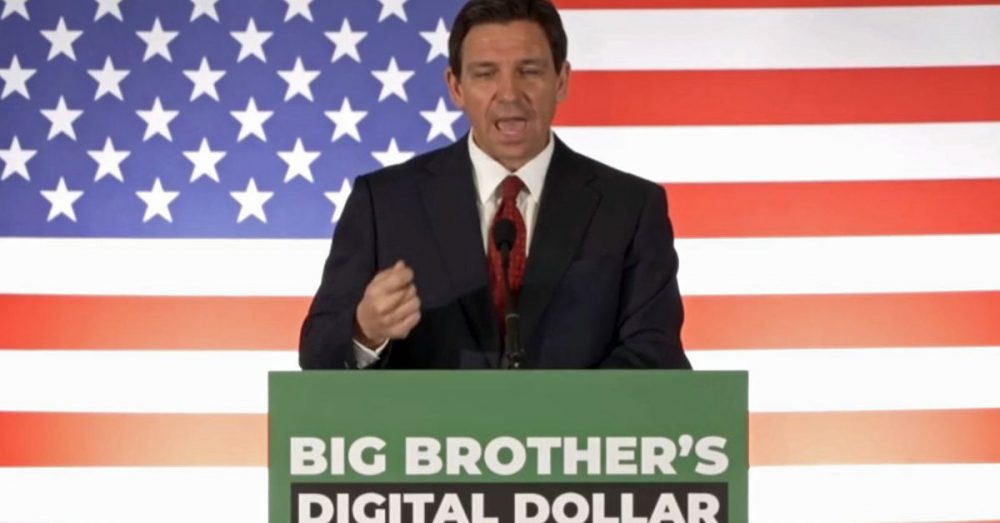The state-level campaign against a U.S. digital dollar made its first foray into established law with Governor Ron DeSantis’ signature on Florida’s effort to block the use of virtual government-backed money in business transactions.
But the Florida governor’s rhetoric that his state is banning central bank digital currencies (CBDCs) as “government overreach and woke corporate monitoring” may not amount to much on paper. Legal experts in this facet of commercial law suggest the state’s effort is nonsensical and potentially harmful for the digital assets sector DeSantis said he’s trying to protect.
“They didn’t ban anything,” said Carla Reyes, an assistant professor at Southern Methodist University’s Dedman School of Law, who has done work in both digital assets law and the Uniform Commercial Code (UCC) that Florida is focused on. “The law does exactly zero of the things that it says that it does.”
The state’s new tweak “expressly prohibits the use of a federally adopted CBDC by excluding it from the definition of money within Florida’s Uniform Commercial Code,” according to the governor’s office. From introduction to his signature last week took just 43 days.
DeSantis – one of the Republican Party’s early favorites as a potential presidential candidate next year – turned his May 12 signing of the law into a political event, claiming it as the start of a potential multi-state push from Republican state lawmakers to counter a digital dollar well before the federal government decides whether to issue it or not. North Carolina has also been considering a measure to oppose a U.S. CBDC, and South Dakota Gov. Kristi Noem recently vetoed a bill to update its UCC in a way she argued would have allowed for CBDCs and “a potential future overreach by the federal government.”
“We’re on offense in the state of Florida,” DeSantis said at a press conference, standing behind a sign reading “Big Brother’s Digital Dollar,” referencing George Orwell’s tale of supreme government control, “1984.” The new law – effective in July – declared digital dollars won’t be considered money in the state’s version of the commercial code.
The UCC represents an accord among states, which have largely adopted this common set of rules for buying and selling of goods and conducting other financial transactions across state borders. Florida has officially thrown its CBDC wrench into that standardization, saying digital dollars aren’t money as defined in the code. But it doesn’t really ban CBDC use in interstate commerce, just puts those assets in another category than money, lawyers say.
“I could still buy a computer using CBDCs if that’s what they wanted me to pay in,” said Reyes, who said the government-backed assets would now fall into the bucket of “general intangibles” under the UCC. “The UCC doesn’t have the power to ban people from using any type of exchange. That’s not what it does.”
CBDC Opposition
DeSantis called the CBDC “a massive transfer of power from individual consumers to a central authority,” and he said the federal government would “have the ability to control where that money is going,” citing a future government’s ability to stop gun purchases or halt somebody from buying too much gasoline.
Though DeSantis and other Florida Republicans suggest the U.S. is definitely heading toward issuing a digital dollar, that view isn’t yet reflected by what’s happening. While the administration of President Joe Biden is under orders to develop the concept of a U.S. CBDC, no federal entity has yet declared support for issuing it.
The Federal Reserve would be in charge of the digital dollar, and officials including Chair Jerome Powell have said the central bank won’t act without backing from the White House and Congress. The Fed also doesn’t want to be in the retail CBDC business, so officials have declared that it won’t administer individual accounts and that people’s transactions would have to be managed by banks or in other outside digital wallets.
DeSantis acknowledged that if Congress eventually authorizes a U.S. CBDC, the state may have to back down. But more than that, Andrea Tosato, a legal scholar who has advised on UCC amendments and teaches at University of Pennsylvania’s Carey Law School, said that any federal law on this point will automatically override state law.
If that happens, though, it won’t have anything significant to override in Florida, he and Reyes suggested.
The UCC Reality
The UCC represents longstanding, battle-tested standards for basic transactions, and they‘re meant to be “super boring” and nonpolitical, Tosato said. The Florida effort to use it as a shield against digital dollars is “painting the UCC as something that it is not.”
The UCC gives both sides of transactions basic legal protections, Tosato explained, but it doesn’t tell them what they can or can’t exchange. That’s the job of regulations or criminal codes.
When one digs into “the rabbit hole and the craziness of what was done with this Florida bill,” Tosato said, “there is no light-bulb moment. It makes no sense.”
The governor’s office didn’t respond to a request for comment on these points. DeSantis suggested during his press conference that he wasn’t just protecting people’s financial privacy but was also seeking to defend crypto from federal government interference.
“I think they want to crowd out and eliminate other types of digital assets like cryptocurrency, because they can’t control that,” he said.
While Florida rewrites its single-state corner of the 50-state standards, though, it’s also rebuffing a set of amendments suggested last year that were meant to set standards for the interstate use of cryptocurrencies, including in such examples as the use of bitcoin as collateral in lending. That could have been a foundation for digital assets in commerce, Tosato argued, and other states have been moving forward to adopt the changes.
Even the way Florida defines a CBDC could be problematic. Its new law says a CBDC is a government-issued digital currency “that is made directly available to a consumer,” but Tosato contends that doesn’t reflect any of the current or planned CBDCs, which generally have service providers manage the accounts or wallets for using the virtual currency.
“There is no CBDC anywhere that is issued directly to consumers,” Tosato said.
Recommended for you:
- Unstoppable Domains to Roll Out Web3 Messaging Service on Polygon
- DeFi Giant MakerDAO Integrates Blockchain Data Provider Chainlink for DAI Stablecoin
- File-Sharing Service WeTransfer Partners With Blockchain Platform Minima on Mobile NFT Solution
As DeSantis and his allies celebrate their CBDC ban, Tosato says they’ve compromised the UCC’s crypto modernization and are misrepresenting the meaning of their overhaul of Florida law.
“It’s done in a way that makes no sense and is completely broken,” he said.







